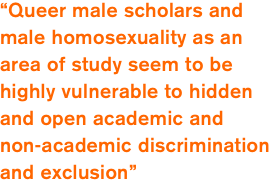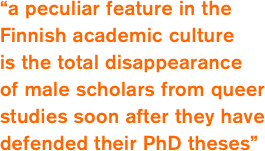
While queer studies in the US have been criticized for being dominated by (white) male, middle-class gay theorists, a peculiar feature in the Finnish academic culture is the total disappearance of male scholars from queer studies soon after they have defended their PhD theses. We have chosen to call this worrisome feature the “queer SCUM phenomenon”, thus cheekily referring to Valerie Solanas’ SCUM Manifesto (Society for Cutting Up Men). This multifaceted queer SCUM phenomenon has been apparent for many years now, and it seems to be facilitated by a persistent homophobia. Most alarmingly, the problems for queer male scholars do not seem to be on the decline, but rather becoming ever more aggravated. |  | 
|
Olli Stålström, one of the gay pioneers and a co-author of the first Finnish scholarly book on lesbians and gays in 1984, defended his thesis on the history of the medicalisation of homosexuality at the University of Kuopio in 1997. The publication of his thesis was soon followed by a taxing libel charge by an offended psychiatric.[7] Although Stålström’s defence lawyer, a prestigious human rights activist, straightforwardly refuted the charges and the court found Stålström to be not guilty and consequently dismissed all charges and claims against him, the prolonged pressure caused by the court case took a heavy toll on the scholar. Although Stålström has remained a keen gay activist publishing, among other things, the FinnQueer website, he has found it impossible to continue with his professional research career ever since. |  | 
|
Jan Löfström defended his dissertation on antinormative sexualities in agricultural Finland at the University of Essex in 1994, edited the Journal of Homosexuality volume on Scandinavian homosexualities (1998) and received an honorary position as a docent in historical anthropology. However, he soon took the consequences of the desolate job market situation for queer scholars and left the field. Over ten years now, Löfström is the only queer male scholar with a tenured position, but his lectureship in History Education at the Department of Education at the University of Helsinki is not related to his former interest in queer studies. After his thesis defence in 1999, Kari Huotari continued for some time to work on a project on men who have sex with men, but after receiving a temporary professorship at the Department of Social Policy he has moved on to doing evaluation work and to studying the services provided for drug users and game addicts. Hence his work is no longer associated with queer scholarship. Whereas Löfström did return to Finland after his dissertation, Mikko Tuhkanen, a specialist in African-American literature, decided to go abroad after the occasion. He defended his first PhD at the University of Tampere in 2000, but soon exiled through the Netherlands to the United States where he wrote his second PhD thesis in 2006. He currently works in the States as an assistant professor in English, with warm but only sporadic contact to Finnish queer scholars. Jan Wickman, a sociologist, has studied and made his career in the Swedish-language Åbo Akademi University. Two years after his PhD on trans communities in Finland in 2001, Wickman got a three-year post-doc funding from the Academy of Finland. After the post-doc term, however, also his career has been marked by alternating short-term funding for research focusing on minorities and periods of unemployment. At the moment, he is working as a visiting scholar at Lund University, Sweden, from where he continues to the University of Oslo, Norway, on one-year funding by the Academy of Finland. It can only be hoped that he, too, is not about to leave Finland for good. The art historian and scholar in visual culture studies Harri Kalha defended his highly acclaimed dissertation on Finnish design and applied art in 1997. He is a prolific author who has published extensively both nationally and internationally on various themes on art history and visual culture studies. In the past few years, he has published abundantly on queer theory and gay and queer historiography. Nevertheless, out of the twelve years after his PhD he has been unemployed for six years in total. Kalha held his last teaching position in 2006 and is now seriously contemplating leaving both queer studies and even academia on the whole – something that would be yet another remarkable loss for the community of queer scholars. The community is still trying to recover from the loss of the literary scholar Lasse Kekki who left the field in the most concrete sense. His unsolved disappearance in November 2006 on a conference journey in Cairo, Egypt, is a tragic loss hard to endure for the queer scholarly community, both personally and professionally. His disappearance also painfully shows how fragile the presence of queer scholarship is at a department relying on the activity of a single person only. Of all the Finnish male scholars who have defended their theses in gay or queer studies since 1994, Jukka Lehtonen, a sociologist, is the only one who is still living in Finland and both working in the field and being (at least for the moment) employed by the academia. Lehtonen organised his first conference on sexuality and gender studies as a student already in 1988. Before and after his thesis defence in 2003, he has found support in a feminist research group and has been remarkably successful in receiving project-based work as a researcher, gaining research funding and soliciting larger research projects. However, also in his case the short-term funding has repeatedly alternated with periods of unemployment. Lately, Lehtonen has worked at the Department of Education at the University of Helsinki as a post-doctoral fellow. Problems with post-doctoral funding and the lack of tenured positions are recurrent in Finnish academic life, but these well-known problems seem to amass in the group of openly gay or queer male researchers. When looking at their impressive CVs it is evident that their difficulties in establishing a career as queer academics and getting any tenured or long-time positions while working within gender or queer studies cannot be explained with laziness or poor quality of work. Consequently, the reasons must be of a more structural nature. |  | |
Queer male scholars and male homosexuality as an area of study seem to be highly vulnerable to hidden and open academic and non-academic discrimination and exclusion. Not even Jukka Hankamäki, an openly gay philosopher working in the tradition of phenomenology, and vocally opposing feminist and queer theorisation, has gained funding. Those men who have established some name in gay or queer studies have mostly tried (and failed) to maintain a position in their own disciplines. Hence the traditional disciplines seem to be rather prone to signing up for queer SCUM. While the same fate threats queer women, several of them, when facing insurmountable difficulties in their initial disciplines, have been able to move on to work within women’s studies instead. In a sense, the centres of women’s studies have turned into vital intellectual refuges for undesirables. For men, such an option has apparently been available to a lesser extent. We are concerned that these problems faced by individual queer scholars will have devastating consequences for a discipline as a whole as they turn into an overall pattern. When a small field is just about to establish itself, it is simply unbearable for it to lose over and over again the accumulated disciplinary knowledge necessary for offering decent supervision for graduate and post-graduate students, the strategic and managerial understanding required for putting forward larger research projects or the vital personal links to international scholarly networks. |  | 
|

